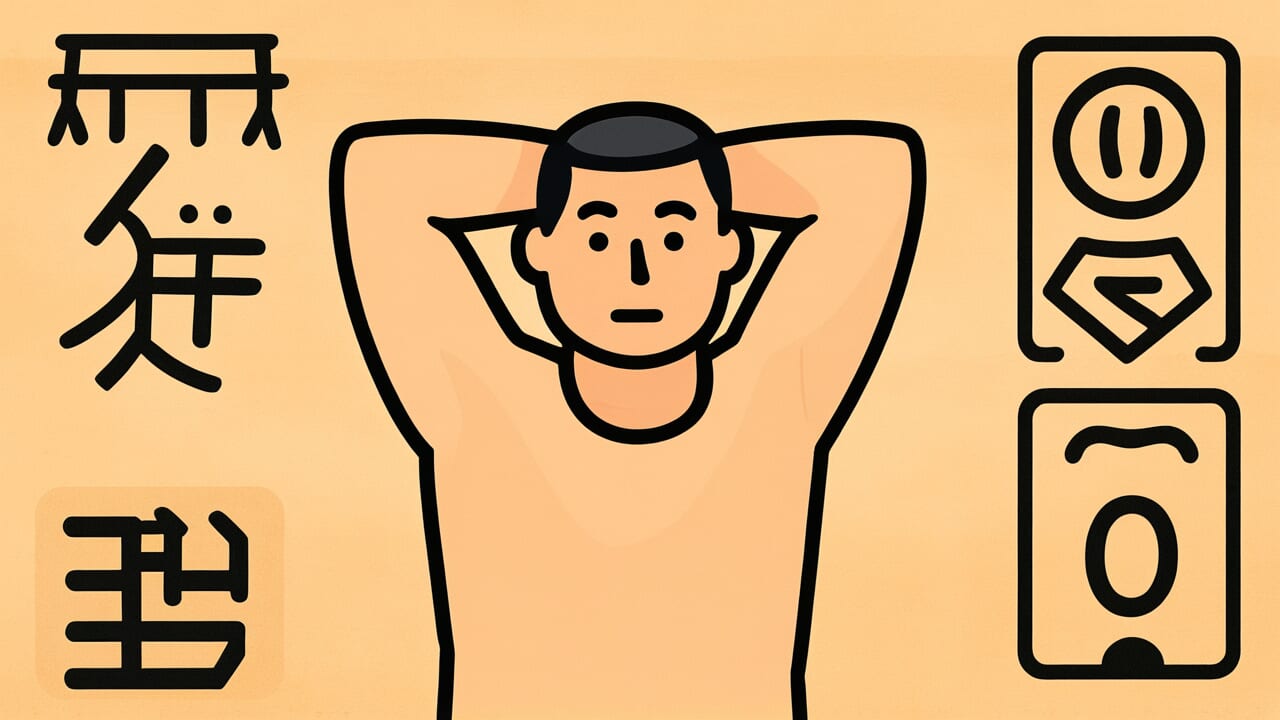How to Read “Lack of strength tenfold, desire for strength fivefold”
Hiriki jūbai yokuriki gobai
Meaning of “Lack of strength tenfold, desire for strength fivefold”
This proverb shows how people can display surprisingly different levels of strength depending on the situation.
Even someone who is normally weak can produce ten times their usual strength in an emergency. When their life is in danger, they tap into hidden power.
When driven by strong desire, people can show five times their normal strength. The motivation of wanting something badly unlocks extra ability.
People use this proverb to explain human potential and the importance of motivation. It describes how people show strength they normally hide when the situation demands it.
The saying also points out how obsessive people become when blinded by desire.
This observation still rings true today. Athletes break records in extreme conditions. Parents show incredible strength protecting their children. These are examples of tenfold strength.
Meanwhile, we can understand fivefold strength when we see how desire for money or status drives people forward.
Origin and Etymology
No clear records exist about when this proverb was created or where it came from. However, the structure of the phrase is quite interesting.
It quantifies how human strength varies with numbers.
“Hiriki” means lack of strength in everyday situations. “Yokuriki” means strength driven by desire. The specific numbers “tenfold” and “fivefold” don’t represent actual measurements.
They emphasize the perceived difference in strength.
Japan has long recognized that people show amazing strength in emergencies. There’s an old expression “kajiba no bakajikara” meaning superhuman strength in a fire.
This proverb takes that observation further. It analyzes the phenomenon more carefully and distinguishes between emergency strength and desire-driven strength.
What’s interesting is that desire produces fivefold strength, not tenfold. This reflects an observation about motivation.
A life-threatening crisis produces more strength than personal desire. The proverb compares these two situations and recognizes that the former draws out greater power.
Our ancestors showed remarkable insight by expressing the relationship between human psychology and physical ability with simple numbers.
Usage Examples
- That person is usually quiet, but when it comes to family, “lack of strength tenfold, desire for strength fivefold” really shows—they work incredibly hard
- They say “lack of strength tenfold, desire for strength fivefold,” and it’s true that human strength when truly cornered is immeasurable
Universal Wisdom
This proverb reveals a universal truth. Human ability is not fixed. It changes greatly depending on situation and motivation.
We usually live with self-imposed limits. But those limits might just be psychological barriers.
The proverb distinguishes between tenfold strength in emergencies and fivefold strength from desire. This shows our ancestors understood that different motivations have different qualities.
Life-threatening situations create altruistic or defensive motivation. Personal desire creates selfish motivation. These draw out different amounts of strength.
This observation offers deep insight into human nature. Our self-preservation instinct is strongest. Desire comes next as a powerful motivator.
But in daily life, these powerful motivations rarely activate. That’s why most people never know their true abilities.
This proverb has been passed down because it conveys something important. It shows the greatness of human potential in simple terms.
The key to unlocking that potential lies in situation and motivation. Unused strength still sleeps within us.
When AI Hears This
In physics, when force is applied in scattered directions, the work done is nearly zero. Imagine ten people pushing a box.
If five push right, three push left, and two push diagonally, the box barely moves. The force vectors cancel each other out.
This is the true nature of “lack of strength tenfold.” Effort without direction dissipates like heat energy.
When desire or will provides direction, the same force produces dramatically different results. In physics, work is maximized when force and movement align.
Even with strength of five, if everyone pushes the same direction, you get five units of result.
But in actual human activity, alignment creates more than just efficiency. A “resonance effect” emerges. Like an orchestra sounding louder than individual instruments, groups sharing a purpose exceed simple addition.
What’s interesting is the proverb’s modest number “fivefold.” Physically, perfect alignment could achieve tenfold efficiency.
But in reality, human will never aligns perfectly. Friction and resistance always exist.
Fivefold might be the optimal value observed between ideal and reality. The practical wisdom embedded here says half efficiency with direction beats no direction at all.
Lessons for Today
This proverb teaches you not to underestimate your own potential. Your everyday self is not your complete self.
Strength you haven’t yet shown definitely sleeps within you.
What matters is knowing the key that unlocks that strength. When you want to protect someone truly important, when you have a goal you genuinely want to achieve, you can show strength that surprises even yourself.
Without strong motivation, that strength stays asleep forever.
Modern society rarely puts us in life-threatening danger. But you have things you care about. Family, dreams, beliefs, someone’s smile.
When you act for truly valuable things, you’ll meet a different version of yourself.
However, this proverb also contains a warning. Desire is a strong force that moves people, but it doesn’t match emergency strength.
Don’t be driven by immediate gain. Use your strength for what truly matters. Choose that kind of life.



Comments